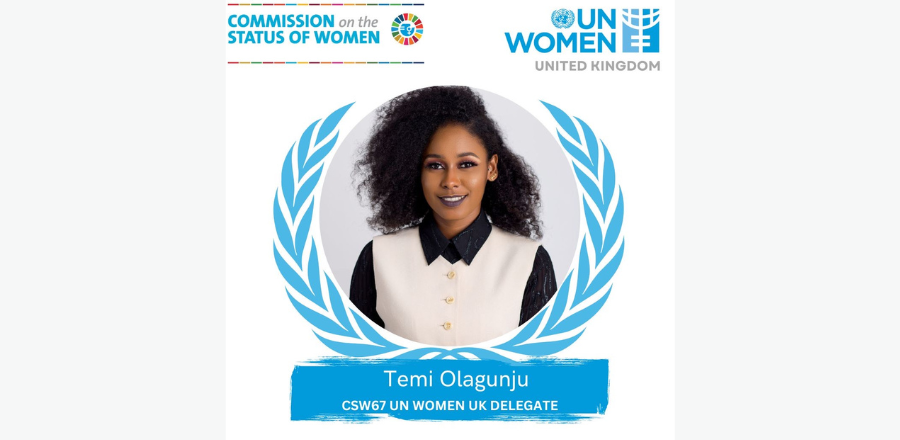Master of Public Health graduate helps battle gender inequality through UN Conference

A former GCU student has had the chance to put the learning from her degree into practice at a United Nations Conference.
Temi Olagunju graduated as a Master of Public Health in 2022 and now works as a research administrator at GCU London. In March this year, she was one of more than 3000 global contributors who took part in the UN Commission on the Status of Women.
Her previous experience as a physiotherapist in Nigeria proved to be the catalyst for Temi to embark on the next stage of her journey at GCU. Now, following graduation, she wants to help provide a generational shift on the attitude towards women around the world.
Temi explained: “I first heard about the conference through Twitter and felt it was definitely something I wanted to be a part of. I’m very passionate about equity and equality, and there’s no way we can talk about them without talking about women’s rights.
“I have first-hand experience and I’m aware of the issues that occur as a result of gender inequality - I’ve experienced it myself through professional and personal experiences. Nigeria is a developing country and there are so many different things that happen, especially in regard to cultural stereotypes which effect women.”
The conference, which took place in-person in New York and online between the 6th and 17th of March, focused on the use of technology in driving gender equality and the importance of closing the digital gender gap around the world.
Temi said: “I was able to tie in a lot of the work I’ve learned through my degree at GCU. Technology is such an important part of what we do in a variety of professional fields, including business, finance and health. Even during the pandemic, technology gave health services a way of continuing to provide help and support during lockdown.”
Interacting with 3000 other like-minded individuals online gave Temi the opportunity to develop her knowledge further and gain a valuable insight into the different gender perceptions held by different countries.
She said: “It was amazing to have access to watch the high-level negotiations that were taking place in New York. A variety of events took place every day and the time difference meant you could even get involved at night.
“We had the opportunity to ask questions and also share our opinions and thoughts via the online platform we were using. It was a great way to interact with all the delegates and other students.
“One of the most important parts was the plenary meeting where representatives from all the United Nations states spoke about the various issues and potential solutions needed for their particular country.”
Reflecting on her overall experience, Temi feels motivated to help drive change across society, both personally and professionally.
“There were a lot of opportunities to learn as a healthcare practitioner but also, more generally, as a woman.
“To have gender equality we must have a generational shift. For that to happen, we have to start with the younger generation and learn about their mindset and the different things they are exposed to. What gender roles are we teaching them? What toys are we giving them? I remember one of the UN officials said, “Instead of giving girls dolls, why don’t we give them microscopes?”
“I’ve always been a very curious person and always wondered why is it pink for girls and blue for boys? If you go to a store, you always see this and it creates a stereotype in your head. This is something we need to be aware of. We need to tackle it from the roots if we want to eradicate the problem and the next generation is the key to that.”
Temi added: “The whole conference was a very enriching experience because I learned things that I would never really come into contact with. For example, one of the speakers discussed the lack of women in the tech industry. I learned a lot about the need for more women in all sectors, but especially in STEM (Science, Technology, Engineering, Maths). When this happens, it will definitely lead to technological advances that incorporate women, which is so important.”
By Ross Clark
Got an SHLS or GSBS story? Email me at Ross.Clark@gcu.ac.uk or message me on Twitter
